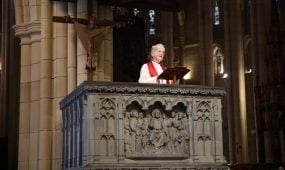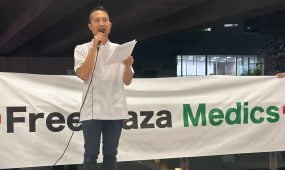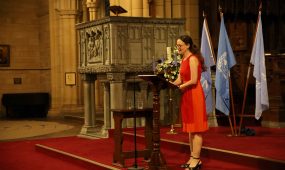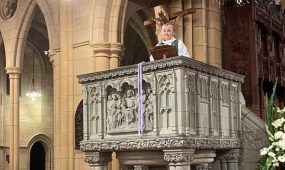Pride Evensong sermon and apology — St John’s Cathedral
Homilies & Addresses
“For those of you who are members of the LGBTIQA+ community who have stuck with the Church, despite everything, thank you. We need you. We can learn from you. We don’t deserve your love and care, but we still have so far to travel, to be a community that represents the body of Christ in all of its diversity, and we are glad that you are with us on that journey,” said Archbishop Jeremy Greaves in his 2024 Pride Evensong sermon
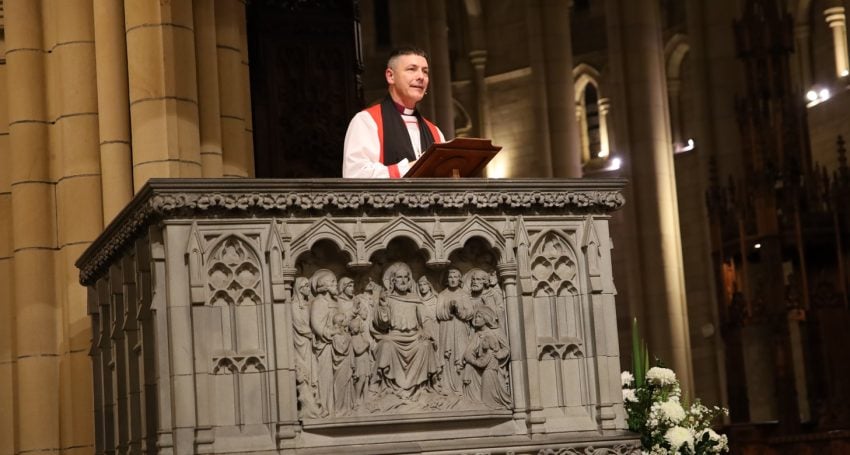
Cathedral Deans get to say and do all sorts of outrageous things — bishops and archbishops, not so much. Being a Dean is the best job in the Church — just ask Peter.
I remember when I was Dean of Darwin and got into all sorts of trouble for suggesting that the way people were treated and included at Darwin’s only gay nightclub, Throb, reflected more of the gospel than the Church does much of the time.
With uncharacteristic nuance, the NT News led with the headline, “ ‘Jesus more likely to be found in Throb than in the Church,’ says Cathedral Dean.”
And it’s true — my experience of the way the LGBTIQA+ community welcomes and includes “the very least of these” puts us to shame most of the time.
The apology is an acknowledgment of some of these failings and a reminder of how much work we’ve got to do if it is to mean anything — and the emails from those who have been too hurt by the Church to hear the apology as anything other than shallow words, insincere, too little too late, are good reminders that, lest we slip into self-congratulatory hubris, we have plenty of work to do. But there are other stories, too.
Not long after Synod, I was visiting a parish where someone pulled me aside after the service. “I want to speak to you about that apology!” she said, and my heart sank.
We moved away from the people gathered around the morning tea table and she lowered her voice. “Thank you,” she said. “I went straight home from Synod and phoned my grandson and apologised to him for any time I had made him feel less than 100 per cent loved for who he is.”
And there are emails from friends and strangers alike saying thank you. For the first time in a long time, my children have been able to share with their friends something about their dad’s job without being embarrassed or ashamed.
And yet, even as we celebrate this small step, there is still much to do. As I keep reminding people, “apology” is simply one more step along the way to reconciliation, to inclusion, to affirmation. The harder piece of work for the Church is to work out what it looks like to live into the apology — how will we be different because of it?
In some ways this echoes the two parts of “Pride” — celebration and protest!
There are the things to celebrate — and there are many — but there is still much about which we should protest. “Pride” holds celebration and protest in tension with each other.
In so many parts of our world life is getting tougher for the LGBTIQA+ community. In Uganda in April a court rejected a bid to overturn the anti-gay law that provides for the death penalty for “aggravated homosexuality”. Last year at least 510 anti-LGBTQ bills were introduced in state legislatures across the United States — a new record and nearly three times the number of such bills introduced in 2022. In our own country, public discourse around trans-people is increasingly toxic and damaging and we are arguing about how to count people in the census!
So, there is much to protest about.
And as I reflect on the Church’s part in all of this, there is plenty for which we should be sorry.
A few years ago, the well-known hymn writer from the Iona Community, John Bell, told the story of Lizzie who had died by suicide.
Lizzie was 14 and grew up in her local church. She was a committed Christian, a member of the scouts, had plenty of friends, and so it was a shock for everyone when she died by suicide in a park near to her home. Three months after her death, at the inquest, it was discovered that shortly before she died, she sent a tweet to a friend in which she said, “I don’t believe that God can love me the way I am.”
All that Lizzie had heard from the Church was that being gay meant God could not love her.
All she heard was that she was not ok. And for Lizzie it was unbearable to accept that God didn’t love her!
And this happens far too often and far too easily.
Lizzie’s appeared to be a normal, middle-of-the-road “caring” church and no one there imagined or noticed that the message they were giving to Lizzie, that she heard so loud and clear, was it is not ok to be gay.
As Anthony Venn-Brown reminds us, it’s a long way from “welcoming” to “inclusive” to “affirming”!
And, of course, Lizzie’s story is repeated over and over, and rejection and discrimination are hallmarks of the stories of so many LGBTIQA+ Christians. And too often we are deaf to the stories and to the hurt and the damage.
A number of years ago, former Senior Australian of the Year Miriam-Rose Ungunmerr Baumann shared the practice, Dadirri — a word that describes inner deep listening, awareness and connection to nature.
She says, “It is our most unique gift. It is perhaps the greatest gift we can give to our fellow Australians. It is inner, deep listening and quiet, still awareness. Dadirri recognises the deep spring that is inside us. We call on it and it calls to us. This is the gift that Australia is thirsting for.”
“Deep listening” was at the heart of the apology process…deep and careful listening to the stories and the pain of LGBTIQA+ people. Really listening, and actually hearing, is a vital precursor to apology.
My hope is that people felt listened to.
Because in the end, it is not for the listeners to decide if a person has been listened to. It is the person sharing their story who knows if they have been listened to.
But I wonder if part of the reluctance within the Church about hearing from LGBTIQA+ people is that listening will open the possibility of change. And change demands taking a risk — a risk of disturbing the status quo.
I hope that this is some of what we’ve done with the apology and the listening process leading up to Synod.
You see, having listened to LGBTIQA+ people, we cannot do anything except move forward, forever changed because of the trust placed in us and the grace with which the stories were shared.
Because, as Lizzie’s stories attests, this is a matter of life and death!
As one writer points out, “Full inclusion of Gay people in the Church isn’t an ‘issue’. This is my life you are talking about.”
All through the gospels Jesus encourages his followers to widen our hospitality to the outsider, the vulnerable, to the ones on the margins — the little ones.
It is this Jesus who says, “Do this in remembrance of me. Accept my hospitality, gather round my table whoever you are, because I have invited you.”
So those of us who gather, at Jesus invitation, do so remembering that Jesus gave his life for the outsider, the stranger, the ungodly, the little ones, so that in response to Love they might also find a place within the community of followers of Jesus, whose primary task is to share the news of God’s love in this broken world.
For those of you who are members of the LGBTIQA+ community who have stuck with the Church, despite everything, thank you.
We need you. We can learn from you. We don’t deserve your love and care, but we still have so far to travel, to be a community that represents the body of Christ in all of its diversity, and we are glad that you are with us on that journey.
We need to keep listening to your stories. To really listen, not just with the head, but with the heart. Deep listening, that will continue to transform us and draw us into deeper and greater communion with our God, where we can all become who we have been created to be, children of a loving God free to love as we have been loved — truly, deeply and fully.
Harvey Milk, once said: “If you are not personally free to be yourself in that most important of all human activities — the expression of love — then life itself loses its meaning.”
And we are called to love…to be love…to show love…to love one another even as we have been loved by God before we knew how to love.
So, together, let us not give up on finding meaning once again in the expression of love for which we have been created and to which every single one of us has been called.
And, let us celebrate the steps being made in that direction, even as we protest, and remember just how much further we have to go.
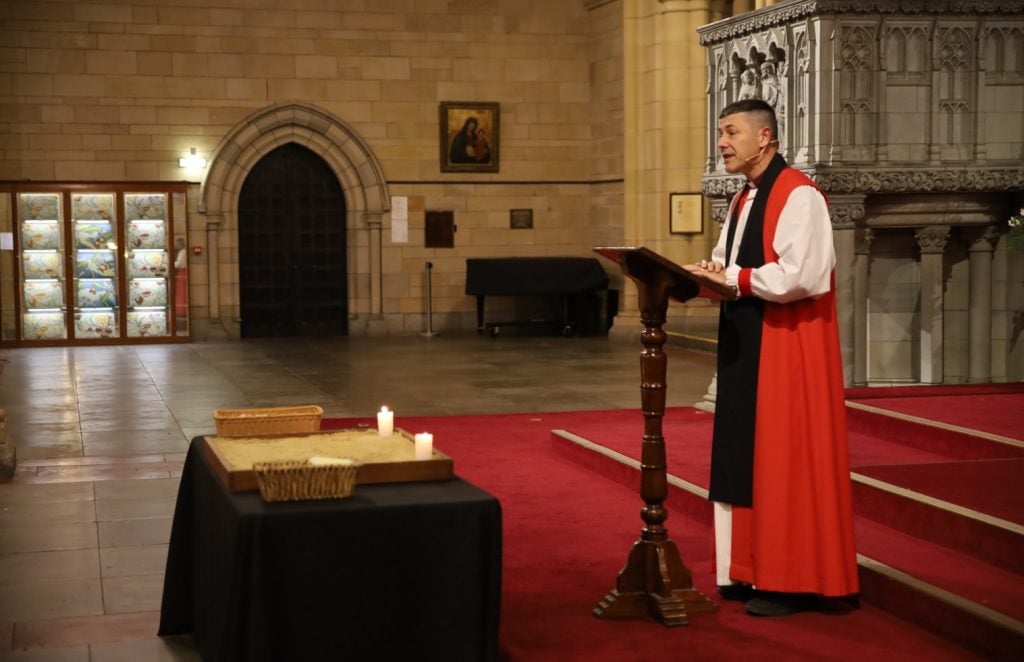
After preaching at the Pride Evensong on 22 September 2024, Archbishop Jeremy Greaves offered the Diocesan apology to sexuality- and gender-diverse people and their loved ones
The Apology
The Anglican Church Southern Queensland:
Recognises and rejoices in the image of God as reflected in every human being, as expressed in people of every race, social circumstance, gender identity and sexual orientation.
Acknowledges the pain felt by any sexuality-diverse and gender-diverse people who feel like second class citizens because they cannot marry in the Anglican Church of Australia.
Apologises to sexuality-diverse and gender-diverse people for the times when:
- We have not accepted that you are who you are;
- We have denigrated you;
- We have unjustly excluded you from baptism, holy communion, holy unction and the community of the Anglican Church;
- We have supported the criminalisation of your sexuality;
- We have advocated for and/or condoned harmful practices forming part of what is known as ‘Conversion Therapy’;
- We have isolated you and subjected you to mistreatment;
- We have not spoken up to protect you from violence and exclusion.
Apologises to the family members and friends of sexuality-diverse and gender-diverse people for the times when:
- Our treatment of your loved ones has hurt you;
- We have failed to grieve or celebrate with you over the challenges and achievements of the ones you love;
- We have silenced or mistreated you.
Undertakes to:
- Pray together in humility;
- Affirm our common humanity as we walk together in following Jesus Christ in our Church;
- Recognise the diversity among us and the ministry of each person who volunteers and works in and for The Anglican Church Southern Queensland;
- Listen to you;
- Stand with you against injustice and marginalisation;
- Live into the expectations outlined in Faithfulness in Service and the Being Together document, endorsed by this Diocese, about how we relate to one another as equal members of the Body of Christ.
We are sorry.
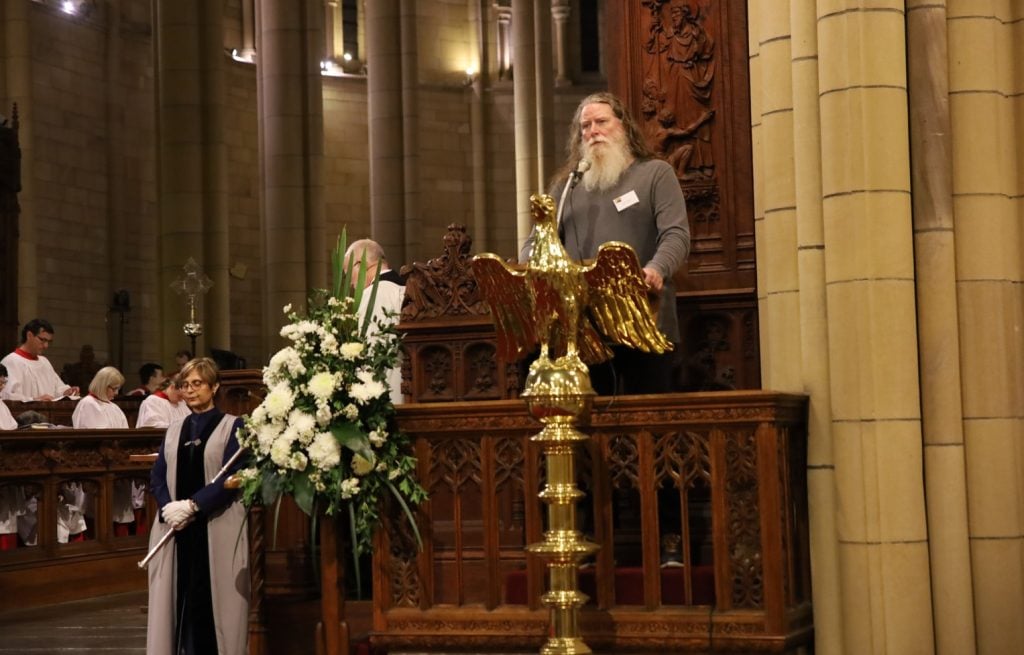
Cathedral community member Blair Martin led prayers at the 2024 Pride Evensong at St John’s Cathedral, Brisbane on 22 September 2024
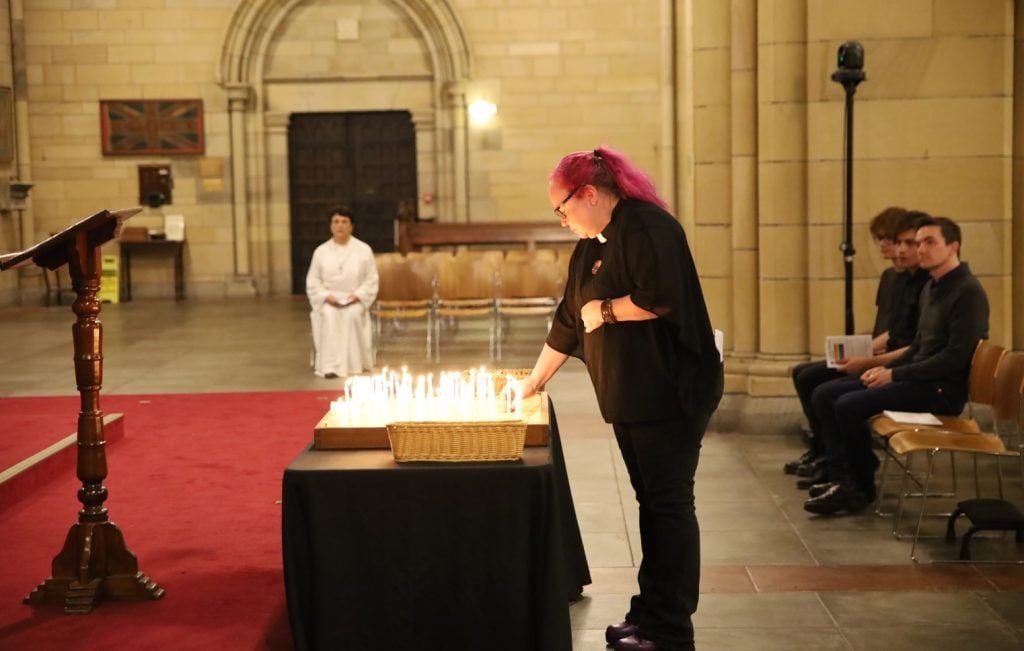
The Rev’d Deb Bird lighting a candle at the 2024 Pride Evensong at St John’s Cathedral, Brisbane on 22 September 2024 — candles were lit as an act of dedication or contrition; or expression of joy, solidarity or sorrow; or as a prayer for healing; or offered with a particular intention for a person or situation
Editor’s note: Immediate support is available for those who may be distressed by phoning 000 in an emergency; Qlife on 1800 184 527 or chat online; Lifeline on 13 11 14; Mensline on 1300 789 978; Kids Helpline on 1800 551 800; and, beyondblue on 1300 224 636.
Jump to next article

